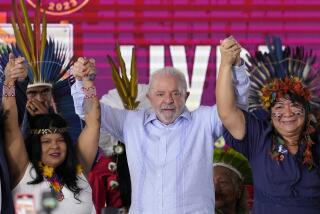Moscow Times They Are A-Changing : Reforms Are Substantial, Putting Gorbachev at Risk
- Share via
“Is Gorbachev for real, or is all this just for show?” That seemed to be the general U.S. reaction to Mikhail S. Gorbachev’s call for secret balloting and multiple candidates in elections for government and non-government posts.
If Gorbachev has his way, party chairmen throughout the system as well as factory and farm managers, even government officials, hereafter will have to stand for election against other nominees. Admittedly, the nominees will be pre-screened and party members will continue to predominate, but, even so, Gorbachev’s proposal adds an element of risk and accountability that has not been a part of the Soviet system.
What’s going on here? One day it’s elections. The next day Andrei Sakharov is freed from exile. Then, to nearly everyone’s amazement, a policy of openness-- glasnost-- is proclaimed. This results not only in more candor but also in the showing of highly sensitive films that had long been regarded as too threatening to the system. In the midst of this new and heady honesty, Gorbachev invites prodigal sons such as former Kirov dancer Mikhail Baryshnikov, who defected in 1974, to perform in Moscow to test the country’s new cultural freedom.
What’s happening to the Soviet system that we love to despise and denigrate? Certainly the Soviet Union still is not Utopia; there are hundreds, maybe thousands, of political prisoners in jail, and the flow of would-be immigrants from the Soviet Union has been cut to near-record lows. But each day seems to bring additional and even bolder reforms. There comes a point when even we old-time cynics have to acknowledge that things may be a-changing.
The natural question is: Why is Gorbachev doing all this? Some would write off his efforts as an attempt to impress the West. After all, how many times have we heard that the Soviet Union has undertaken some new humanitarian effort only to discover that nothing of substance has changed? Undeniably there may be a trace of that here. But, unlike his predecessors, Gorbachev seems to be more interested in substance than show.
Without insisting that everything that he does stems from his desire to upgrade the Soviet Union’s economy, there seems to be little doubt that Gorbachev’s chief concern these days is how to modernize the Soviet economy. He is determined to increase the quality of goods produced while promoting high technology. He apparently has concluded that he cannot achieve economic reform without political reform as well.
Extrapolating from what has been said in the Soviet press, Gorbachev has been dismayed to find his inherited economy riddled with even more corruption, incompetence and self-gratifying leadership than he anticipated. In Uzbekistan and Kazakhstan as well as Moldavia and the Ukraine, the local and national press have begun to expose one sorry scandal after another.
Leaders in these regions have built up little self-sufficient fiefdoms that serve primarily to protect and cater to the local barons. These leaders and their families have managed to silence all opposition. With time, the courts and even the police--including the KGB--have become part of the enterprise so that almost all potential whistle-blowers are either co-opted or intimidated.
If the leaders in Moscow hear no evil and see no evil, then despite their cynicism the presumption in the past has been that there is no evil. When this happens, production reports are easily inflated by local leaders. These leaders find it easy to feather their own nests at the expense of the economy and future economic modernization.
Gorbachev has concluded that there will be no economic breakthrough without the institution of a system of political checks on the potential for abuse. Toward that end, he is trying to introduce an element of uncertainty for Soviet officeholders. Henceforth, they will have to worry that if they do a poor job they may be voted out of office.
As yet, none of this means that the Soviet Union is about to become a parliamentary democracy. The nominating process still will be closely controlled, and there is no intention of allowing anything other than the one Communist Party.
Yet to Soviet conservatives and vested interests Gorbachev already has gone too far. They worry, as the Chinese have discovered, that it is all but impossible to fine-tune political reform. Once the lid on strict party and ideological control is raised an inch, it is inevitable that others will come to demand that it be raised a foot. These first modest steps are regarded as threatening to those currently in power. Instead of a life of certainty and unchecked power, party and government leaders now face uncertainty and restraints, however modest.
Gorbachev deserves praise for his boldness and determination. But will he succeed? Based on the way the bureaucracy has reacted to previous challenges to its prerogatives, the odds are that the bureaucrats will resist. Nikita S. Khrushchev discovered, to his surprise, that when he put too much pressure on the bureaucracy its members secretly organized to force him out. But Khrushchev, as uninhibited as he was, never went so far as to propose elections and secret ballots.
As skilled as Gorbachev is, the odds are not in his favor. The clearest sign that the Soviet Union has indeed changed will be whether not only his current proposals but also Gorbachev himself succeeds.
More to Read
Sign up for Essential California
The most important California stories and recommendations in your inbox every morning.
You may occasionally receive promotional content from the Los Angeles Times.













